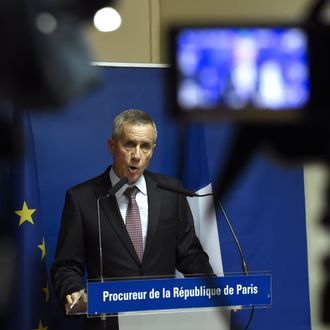
French prosecutor François Molins announced on Tuesday that authorities plan to open an official terrorism investigation into the train attack that ended with three Americans, a French-American professor, and a British businessman tackling and tying up Moroccan suspect Ayoub El-Khazzani. Molins said in a press conference that El-Khazzani’s internet use showed “clear evidence of terrorist intent,” and that he was “attempting to kill a whole train full of people.”
Molins said that the 26-year-old suspect, who faces charges of attempted murder, possession of illegal weapons, and participation in a terrorist conspiracy, allegedly watched an extremist video on his phone before beginning to walk around the train — which was heading from Amsterdam to Paris — with an assault rifle, a handgun, gasoline, 270 rounds of ammunition, and a box cutter. El-Khazzani was offered a cheaper ticket on an earlier train, but insisted on paying $172 for a first-class ticket for the train he ended up riding, which was carrying around 500 people. Authorities said El-Khazzani did not have any good explanations for how he got money for the ticket and weapons. Eventually, he stopped talking to investigators completely.
His lawyer, Sophie David, says that her client says he only wanted to rob passengers, and that he found the weapons in a park in Brussels and has no affiliation with any terrorist groups. Molins, however, said El-Khazzani had been incarcerated several times in Spain, and that he had recently been to Turkey and may have tried to go to Syria.
Authorities raided his sister’s home in Brussels yesterday — near where El-Khazzani boarded the train — and collected “some objects.”
Yesterday, three Americans and one British man who helped stop the potential attack were given the Légion d’honneur by French president François Hollande. American-born professor Mark Moogalian was named as another person who helped avert catastrophe — he was shot and is expected to receive France’s highest honor after he has recovered. His wife, Isabella Risacher-Moogalian, told Europe1, “I did not see my husband get shot; it happened too quickly and I was pretty much hiding behind seats. But I look at my husband through the seats at an angle and he looked straight at me and said, ‘I’m hit!’ … There was blood everywhere. I ran towards him and I could see that he had a wound on his back. I then saw another wound by his neck.” Off-duty soldier Spencer Stone, who is recovering at an American military hospital in Germany after his thumb was nearly severed by a box cutter, reacted quickly when he saw blood squirting out of Moogalian’s neck, according to the BBC. “I just stuck two of my fingers in the hole, found what I thought to be the artery, pushed down and the bleeding stopped. I just said ‘thank God’ and held that position until the paramedics got there.”
Alek Skarlatos, a member of the National Guard added, “He [El-Khazzani] clearly had no firearms training whatsoever. If he knew what he was doing, or even just got lucky … we would have all been in trouble and probably wouldn’t be here today — along with a lot of other people.”
Chris Norman, the British consultant and grandfather honored by France yesterday, recounted the moments before El-Khazzani was tackled to The Guardian. “I heard one of the Americans say: ‘Go get him Spence.’ The other one said: ‘No, you don’t do that, buddy.’ I thought great, somebody’s actually intervening, let me stand up because we’ve got much more chance as a team. Let’s go!” He added, “My message to people is that if it does happen to you, be aware that there is a possibility to act. Don’t act completely rashly but, when the opportunity arises, for God’s sake jump in there.”





























